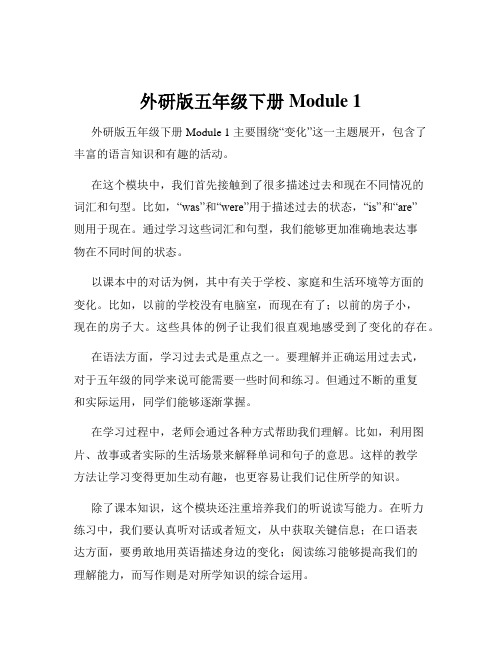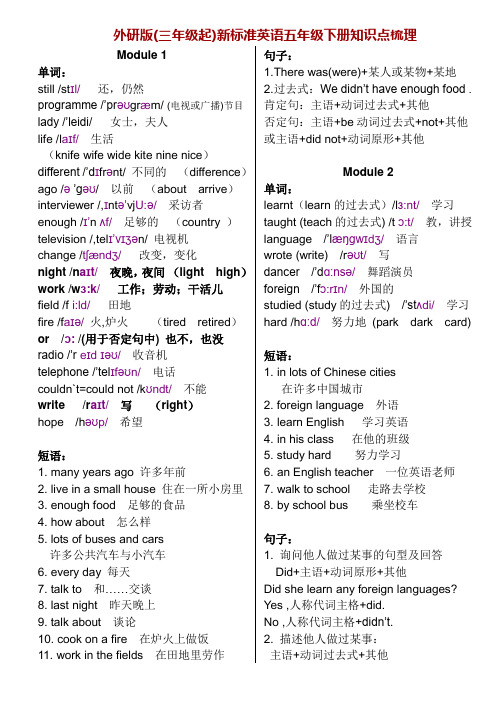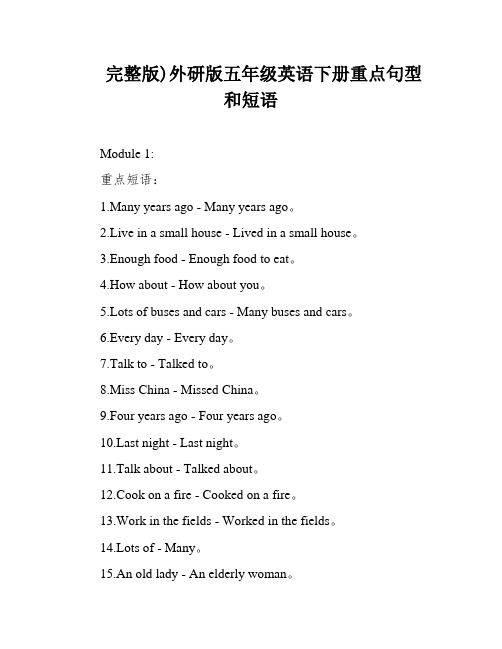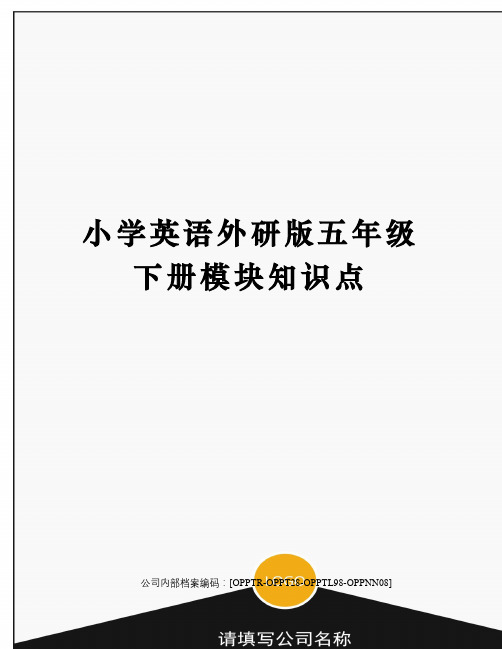外研版五年级英语下册知识点总结 Moudle-1
(一年级起点)新版外研社小学英语五年级下册M1-M10知识点汇总

外研版(一起)第十册英语复习要点整理Module 1词汇:1、drive(过去式drove)驾驶2、flute笛子3、player演奏者4、office办公室5、factory(复数)factories6、shop商店7、hospital医院8、fish 捕鱼,钓鱼(动词)9、farm农场职业名称拓展:1、farmer农民2、postman邮递员3、doctor医生4、nurse护士5、firefighter / fireman消防员6、writer作家7、driver司机8、policeman警察短语:1、in the picture在照片上2、drive a bus驾驶公共汽车3、Chinese music中式音乐4、play the flute吹笛子5、teach English教英语6、work in an office在办公室工作7、work in a factory在工厂工作8、work in a shop在商店工作9、work in a hospital在医院工作10. work on a farm 在农场工作11. a flute / an erhu player 一位笛子(二胡)演奏者12、work at a school 在学校工作13、work at a bank在银行工作语法要点:本模块我们主要学习用一般现在时形式和一般过去时形式谈论某人的职业和具体工作。
要关注时间状语before/now,区分时态。
询问职业及职业中的细分类时要用特殊疑问词What .例:What did your father do ?What does your father do ?询问工作场所要用特殊疑问词Where例句:Where did your father work?Where does your father work ?主要句型:She was a driver before. 以前她是个司机。
外研版五年级下册Module 1

外研版五年级下册Module 1外研版五年级下册 Module 1 主要围绕“变化”这一主题展开,包含了丰富的语言知识和有趣的活动。
在这个模块中,我们首先接触到了很多描述过去和现在不同情况的词汇和句型。
比如,“was”和“were”用于描述过去的状态,“is”和“are”则用于现在。
通过学习这些词汇和句型,我们能够更加准确地表达事物在不同时间的状态。
以课本中的对话为例,其中有关于学校、家庭和生活环境等方面的变化。
比如,以前的学校没有电脑室,而现在有了;以前的房子小,现在的房子大。
这些具体的例子让我们很直观地感受到了变化的存在。
在语法方面,学习过去式是重点之一。
要理解并正确运用过去式,对于五年级的同学来说可能需要一些时间和练习。
但通过不断的重复和实际运用,同学们能够逐渐掌握。
在学习过程中,老师会通过各种方式帮助我们理解。
比如,利用图片、故事或者实际的生活场景来解释单词和句子的意思。
这样的教学方法让学习变得更加生动有趣,也更容易让我们记住所学的知识。
除了课本知识,这个模块还注重培养我们的听说读写能力。
在听力练习中,我们要认真听对话或者短文,从中获取关键信息;在口语表达方面,要勇敢地用英语描述身边的变化;阅读练习能够提高我们的理解能力,而写作则是对所学知识的综合运用。
对于这个模块的学习,同学们需要多做一些练习题来巩固所学。
可以通过模仿课本中的句子来写自己的句子,或者和同学一起用英语交流关于变化的话题。
此外,家长也可以在日常生活中引导孩子观察周围的变化,并用英语表达出来。
比如,一起讨论城市的变化、家庭生活的变化等等。
总的来说,外研版五年级下册 Module 1 为我们打开了一扇了解变化的窗户,让我们在学习英语的同时,也能够学会用英语去描述和思考生活中的变化,这对我们的语言能力和思维发展都有着积极的影响。
希望同学们都能认真学习这个模块,从中收获知识和乐趣。
在学习的道路上,每个同学可能会遇到不同的困难。
有的同学可能在词汇记忆方面有困难,有的同学可能在语法理解上感到吃力。
(完整版)外研版小学英语五年级下册知识点梳理

外研版(三年级起)新标准英语五年级下册知识点梳理Module 1单词:still /stɪl/ 还,仍然programme /’prəʊgræm/ (电视或广播)节目lady /’leidi/女士,夫人life /l aɪf/ 生活(knife wife wide kite nine nice)different /’dɪfrənt/ 不同的(difference)ago /ə’gəʊ/ 以前(about arrive)interviewer /,ɪntə’vj U:ə/ 采访者enough /ɪ’nʌf/ 足够的(country )television /,telɪ’vɪʒən/ 电视机change /tʃændʒ/ 改变,变化night /n aɪt/ 夜晚,夜间(light high)work /wɜ:k/ 工作;劳动;干活儿field /f i:ld/ 田地fire /f aɪə/ 火,炉火(tired retired)or /ɔ: /(用于否定句中) 也不,也没radio /’r eɪd ɪəʊ/ 收音机telephone /’telɪfəʊn/ 电话couldn`t=could not /kʊndt/ 不能write /r aɪt/ 写(right)hope /həʊp/ 希望短语:1. many years ago 许多年前2. live in a small house 住在一所小房里3. enough food 足够的食品4. how about 怎么样5. lots of buses and cars许多公共汽车与小汽车6. every day 每天7. talk to 和……交谈8. last night 昨天晚上9. talk about 谈论10. cook on a fire 在炉火上做饭句子:1.There was(were)+某人或某物+某地2.过去式:We didn’t have enough food .肯定句:主语+动词过去式+其他否定句:主语+be动词过去式+not+其他或主语+did not+动词原形+其他Module 2单词:learnt(learn的过去式)/lɜ:nt/ 学习taught (teach的过去式) /tɔ:t/ 教,讲授language /’læŋgwɪdʒ/ 语言wrote (write) /rəʊt/ 写dancer /’dɑ:nsə/舞蹈演员foreign /’fɔ:rɪn/ 外国的studied (study的过去式) /’stʌdi/ 学习hard /hɑ:d/努力地(park dark card)短语:1. in lots of Chinese cities在许多中国城市2. foreign language 外语3. learn English 学习英语4. in his class 在他的班级5. study hard 努力学习6. an English teacher 一位英语老师7. walk to school 走路去学校8. by school bus 乘坐校车句子:1. 询问他人做过某事的句型及回答Did+主语+动词原形+其他Did she learn any foreign languages? Yes ,人称代词主格+did.No ,人称代词主格+didn’t.2. 描述他人做过某事:She learnt English.3.描述他们现在在做某事:主语+be+动词ing+其他He is learning English now .Module 3单词:hamburger /’hæmbəgə/ 汉堡English /’ɪŋglɪʃ/ 英国(式)的breakfast /’brekfəst/早餐,早饭lunch /lʌntʃ/ 午餐,午饭sandwich /’sændwɪtʃ/ 三明治fish and chips/fɪʃtʃɪps/ 炸鱼加炸薯条traditional /trə’dɪʃənəl/ 传统的dish /dɪʃ/ 食品;菜肴gave(give的过去式)/g eɪv/ 给tonight /tə’naɪt/ 今夜,今晚短语:1. very much 很,非常2. an e-mail from Lingling一封来自玲玲的电子邮件4. about English food 关于英国食物5. have an English breakfast吃了一顿英式早餐6. have …for lunch 吃…作为午餐7. a traditional English dinner一顿传统的英式晚餐8. give …to … 把……给……9. at school 在学校句子:1.描述吃过某些食物:主语+ had + 食物名称+ 其他2.询问他人打算吃/喝什么:What are you going to eat/drink ? 3.询问他人三餐吃了什么:What + did + 主语+have+for breakfast / lunch / dinner ?Module 4单词:library /’l aɪbrəri/ 图书馆student /’stj U:dənt/ 学生sent(send的过去式) /sent/ 发送,寄idea /aɪ’dɪə/ 主意,想法put /put/ 放,安放heavy /’hevi/重的,沉的dictionary /’dɪk ʃənəri/ 词典;字典card /kɑ:d/卡片ask /ɑ:sk/邀请wrong /rɒŋ/错误的dear /dɪə/ 哎呀information /,ɪnfə’meɪʃən/ 信息project /’prɒdʒekt/ 项目guide /g aɪd/ 介绍,指南,手册film /fɪlm/ 电影way /w eɪ/方法,方式on关于短语:1. library card 图书卡,借书证2. on Shelf C 在C架上3. as well /æs wel/ 又,还,也句型:1.询问某物在何处及回答的句型:Where are the …about…, please?Where can you find out about …?You can find out … in / on …Module 5单词:light /l aɪt/ 轻的hard /hɑ:d/困难的,费力的department store /dɪ’pɑ:tm əntst ɔ:/百货商店pocket /’pɒkɪt/ 口袋,兜umbrella /ʌm’brelə/ 雨伞sales assistant /s eɪlzə’sɪstənt/售货员,营业员wheel /w i:l/ 轮子easy / i:zi/ 容易的,不费力的take /t eɪk/ 选择要,选择购买too /t U:/ 太,过于try /tr aɪ/ 试,尝试lovely /’lʌli/ 美丽的,可爱的;令人愉快的短语:1. at the department store 在百货商店2. buy you a new one 给你买一个新的3. be easy for you 对你来说很容易4. be too…for…对…来说太…5. take…to… 把…带到…句型:1. 描述事物特征的句型:It’s get……(big反义small,heavy反义light,easy反义hard)2. 表达看法:It’s + 形容词+ for +人称代词宾格Module 6单词:moon /m U:n/ 月亮,月球get /get/ 到达west /west/ 西,西部,西方;向西方parent /p eərənt/ 母亲;父亲;家长stay /st eɪ/ 停留(play day say)July /dʒʊ’laɪ/ 七月south /s aʊθ/南,南部,南方;向南方remember /rɪ’membə/ 记得June / dʒ U:n/ 六月east / i:st/ 东,东部,东方;向东方best /best/ 最好的north /nɔ:θ/北,北部,北方;向北方rest /rest/ 休息rode(ride的过去式)/rəʊd/ 骑短语:1. have a rest 休息一下2. of course 当然3. in the west of China 在中国的西部4. go there 去那儿5. last year 去年6. stay with 和……呆在一起7. in July 在七月8. every year 每年9. Li people 黎族人10. ride a horse 骑马句型:1.用方位词表达地点:It’s in the north / south / east / west of…Module 7单词:evening /‘ɪvənɪŋ/傍晚,晚上late /l eɪt/近日暮的;近深夜的;时间不早的worker /’wɜ:kə/ 工人factory /’f æktəri/ 制造厂;工厂early /’ɜ:li/ 早的taxi /’t æksɪ/ 出租车,计程车quarter /’kwɔ:tə/ 一刻钟to(距整点)差......worry /’wʌri/ 焦虑,担心短语:1. go to work 上班2. be home 在家句型:1. My father goes to work at eight o’clock every morning.2. What does he do?He’s a policeman/worker.3. What does she do?She’s a taxi driver.4.Will you be home at seven o’clock? Yes, I will. I’ll be home at seven o’clock.5. What time will you be home?I’ll be home at seven o’clock.6.英语时间的表达法:1)整点:8:00——eight o’clock2)分钟小于或等于30,就用past来表示,结构:分钟+ past + 该点钟12:05—— five past twelve9:30——half past nine3)分钟大于30,就用to来表示,结构:分钟+ to + 下一点钟8:40——twenty to nine4)分钟是15,一般用a quarter 来代替fifteen。
外研版(三起)-英语-五年级下册--Module1Unit1教材同步讲解

外研版(三起)-英语-五年级下册--Module1Unit1教材同步讲解【新课堂】Module1 Unit 1教材同步讲解同学们,你们知道许多年前你们的爷爷奶奶过着怎样的⽣活吗?你们了解他们现在的⽣活和过去的⽣活有着什么样的变化吗?⼀起来学习⼀下吧,学习怎样⽤英语描述过去和现在的⽣活的变化吧!语法索引Unit l(第⼀单元)1.still的⽤法,in the UK与in England的区别及with的⽤法 (6)2. look的⽤法,祈使句简介及about的⽤法……⼀………⼀(7)3.come的含义……⼀………..(8)4. life的⽤法及辨析very与too,many与some.ago与before (8)5.how的⽤法……“ ………..(9)6. live in的⽤法及辨析house, home与family (10)7.-般过去时及enough的⽤法 (10)8.There be句型及辨析some与any9.have表⽰“有”……10.动名词的⽤法…11.现在进⾏时简介…………Unit 2(第⼆单元)12.really的⽤法……13.辨析talk,say和speak……15.or的⽤法………16.miss的⽤法……17.hope的⽤法……18. back then酌⽤法…………模块⽬标预览学前必备知识⽬标语⾳能熟练掌握⾳标/eI/,/o:/,/a:/的发⾳要领,并能分辨字母组合ai,al,ar,au和ay在单词中的发⾳。
词汇单词life(⽣活),different(不同的),ago(以前),teievision(电视机),enough(⾜够的),change(改变,变化),night(夜晚,夜间),or(也不,也没),couldn't= could not(不能),write(写),grandchildren,lady(⼥⼠,夫⼈),fire(⽕,炉⽕),radio(收⾳机),hope(希望),telephone (电话),field(⽥地),programme(节⽬),interviewer(采访者)短语a programme about China(⼀个关于中国的节⽬),many years ago(许多年前),live in a small house(住在⼀所⼩房⼦⾥),enough food(⾜够的⾷物),lots of buses and cars(许多公共汽车和⼩汽车),talk to...(和…~交谈),have got(拥有),watch TV(看电视),talk about(谈论),on a fire(在炉⽕上),in the fields(在⽥地⾥),in the UK(在英国)同学们,下列词汇要求你们能听懂、会说、会读,你们能做到吗?单词world(世界),past(过去),wherever(各处,处处)短语every day(每天),how about_(……怎么样),miss China(想念中国)句型同学们,下列⽇常⽤语要求你们能听懂、会说、会读、会写,你们能做到吗?1.There be句型的过去时:There was/wasn't/were/weren't+某⼈/某物⼗某地.某地有/没有某⼈/某物。
完整版)外研版五年级英语下册重点句型和短语

完整版)外研版五年级英语下册重点句型和短语Module 1:重点短语:1.Many years ago - Many years ago。
2.Live in a small house - Lived in a small house。
3.Enough food - Enough food to eat。
4.How about - How about you。
5.Lots of buses and cars - Many buses and cars。
6.Every day - Every day。
7.Talk to - Talked to。
8.Miss China - Missed China。
9.Four years ago - Four years ago。
st night - Last night。
11.Talk about - Talked about。
12.Cook on a fire - Cooked on a fire。
13.Work in the fields - Worked in the fields。
14.Lots of - Many。
15.An old lady - An elderly woman。
16.A programme about China - A program about China.重点句型:1.There was(were)+某人或某物+某地 - There was(were)+ XXX(即there be句型的过去式)如:There XXX’t any buses。
There were no buses。
(any意为“一些”用于否定句)2.XXX food。
- We didn't have enough food to eat.这里的didn’t为助动词,后接动词原形)3.Thank you for talking to us。
- Thank you for talking with us.for是介词,后接动词的ing形式。
外研版(三起)小学英语五年级下册知识点归纳总结

外研版(三起)小学英语五年级下册知识点归纳总结Module 1一、音标ai——[eɪ] ——rain, main, waital——[ɔ:] ——walk, talk, tallar——[eɪ] ——farmer, far, park, partyay——[eɪ] ——play, may, day, sayau ——[ɔ:] ——autumn, August, authorar ——[ɔː] ——warm, quarter, war二、单词still 还,仍旧programme 〔电视或播送〕节目lady 女士,夫人different 不同的ago 以前interviewer 采访者enough 足够的television 电视机grandchildren 〔grandchild 的复数形式〕〔外〕孙子;〔外〕孙女change 转变,变化night 夜晚,夜间work 工作;劳动;干活儿field 田地fire 火,炉火or 〔用于否认句中〕也不,也没radio 收音机telephonecouldn”t = could not 不能hope 期望三、固定搭配live in 住在......watch TV 看电视a small village 一个小村庄talk about 谈论in the fields 在田地里last night 昨天晚上every day 每天enough food 足够的食物lots of 很多a television programme 一个电视节目四、句子1.There are two beautiful cats on the chair. 有两只秀丽的小猫在椅子上。
2.Life was very different in China many years ago. 在很多年前中国的生活对于现在有着很大的区分。
3.We lived in a small house. We didn’t have enough food. There weren’t many buses. There weren’t any televisions. 我们住在小房子里。
2021春外研版五年级英语下册 Module 1 Unit 2 授课+习题课件

or 连接;or 常用于疑问句或否定句中, and 用于肯定句中。 例句:She hasn’t got an apple or an orange. 她没有苹果,也没有橘子。
讲解来自《点拨》
五、单项选择。
( C )1. I ________ a television programme last night.
A. watch
B. is watching C. watched
点拨:last night是表示过去的时间,所以句 子时态为一般过去时,动词用过去式。
( B )2. They didn't have a television ________ a
(昨天晚上).
习题来自《点拨》
二、改为否定句。 1. We went to the zoo last week.
We __d_i_d_n_’_t_ ____g_o___ to the zoo last week. 2. There were some shops.
There _w__e_r_en__’t_ ___a_n_y___ shops. 3. I watched a programme last week.
谓语动词为实义动词,时态为一般过去时的否定句 句型结构: 主语 +didn’t+ 动词(短语)原形 + 其他 .
典例 句型转换。 Tom had a big house.(变为否定句) _T_o_m__d_i_d_n_’t__h_a_v_e_a__b_ig__h_o_u_s_e_. ________
三、请在下列单词前加一个字母, 使之变为另一个 单词, 并仿照例子写一个短语。【加法记忆法】 例: long — along along the river 1. go —____a_g_o__ ____fi_v_e_d_a_y_s__a_g_o__ 2. any —__m__a_n_y__ ____m_a_n_y__b_o_o_k_s___ 3. our —__h__o_u_r__ ____h_a_lf_a_n__h_o_u_r___
小学英语外研版五年级下册模块知识点

小学英语外研版五年级下册模块知识点公司内部档案编码:[OPPTR-OPPT28-OPPTL98-OPPNN08]Module 1 Unit 1重点句子:1.She was young in this picture.她在这张照片里很年轻.否定句:She wasn’t young in this picture.一般疑问句:Was she young in this picture2. She was a driver before.她以前是一个司机.否定句:She wasn’t a driver before.一般疑问句:Was she a driver before肯定回答:Yes, she was. / No, she wasn’t.就划线部分提问:What was she before3.He played Chinese music.他演奏中国音乐.否定句:He didn’t play Chinese music.一般疑问句:Did he play Chinese music肯定回答:Yes, he did. / No, he didn’t.就划线部分提问:What music did he play4.I can play the flute, too. = I can also play the flute.我也会演奏笛子.5. She drove a bus.她开公共汽车.就划线部分提问:What did she drive6. He teaches us English.他教我们英语.就划线部分提问:What does he teach us7. She helped children.她帮助了孩子们.就划线部分提问:What did she do重点单词:1. grandma2. picture祖母,奶奶图片,照片3. player 玩家,演奏者,运动员,演员Module 1 Unit 2重点句子:1.My grandpa worked in an office.他在办公室工作.否定句:My grandpa didn’t work in an office.一般疑问句:Did your grandpa work in an office肯定回答:Yes, he did. / No, he didn’t.就划线部分提问:Where did your grandpa work2.My mother works in a hospital.我(de)妈妈在医院上班.否定句:My mother doesn’t work in a hospital.一般疑问句:Does your mother work in a hospital 肯定回答:Yes, she does. / No, she doesn’t.就划线部分提问:Where does your mother work3.My parents work in a factory否定句:My parents don’t work in a factory.一般疑问句:Do your parents work in a factory肯定回答:Yes, they do. / No, they don’t.就划线部分提问:Where do your parents work4.There were no computers like there are today.过去不像今天这样,有电脑.5. I was a teacher before.就划线部分提问:What were you before重点单词和短语:1. office2. factory3. hospital办公室工厂医院4. parents 6. shop 7. in the sun父母商店在阳光下very hard工作非常努力Module 2 Unit 1重点句子:1.I’ve got an email from Lingling. 我收到玲玲发(de)一封电子邮件.2.It’s about English food. 它是关于英国食物(de).3.Yesterday she had an English breakfast. 昨天她吃了一顿英国式早餐.4.She had eggs and sausages for breakfast. 她早餐吃了鸡蛋和香肠.否定句:She didn’t have eggs and sausages.一般疑问句:Did she have eggs and sausages肯定回答:Yes, she did. / No, she didn’t.就划线部分提问:What did she have for breakfast5.It’s a traditional English dinner. 它是一顿传统(de)英国式晚餐.6.She says it’s delicious.否定句:She doesn’t say it’s delicious.一般疑问句:Does she say it’s delicious肯定回答:Yes, she does. / No, she doesn’t.就划线部分提问:What does she say重点单词:1. email2. food3. breakfast4. lunch电子邮件食物(不可数)早餐午餐5. dinner6. sausages7. sandwiches8. chips晚餐香肠三明治薯条9. traditional 10. delicious 11. different传统(de)好吃(de)不同(de)Module 2 Unit 2重点句子:1.English people usually have breakfast at seven o’clock. 英国人通常在7点钟吃早餐.就划线部分提问:What time do English people usually have breakfast2.Sundays are special in England. 在英国每周日是很特别(de).3.Families usually eat lunch together. 家人们通常一起吃午餐.4.They eat chicken, potatoes and vegetables. 他们吃鸡肉,土豆和蔬菜.5.On Fridays, many people eat fish. 在每个周五,许多人吃鱼.6.He has dinner at half past twelve.就划线部分提问:What time does he have dinner7.She has biscuits and noodles.What did she have重点单词:1. England2. usually3. special4. families英国通常特别(de) family(de)复数5. together6. chicken7. potatoes8. vegetable一起鸡,鸡肉 potato(de)负数蔬菜9. want to do sth.想要做某事.10.food食物/ meat肉/ fish鱼肉/ chicken鸡肉这几个词都是不可数名词.Module 3 Unit 1Wordsreturn 归还 computer计算机,电脑 like 喜欢card 卡片,名片 week 星期,周video 录像,视频 shelf架子library 图书馆favourite 特别喜欢(de) return 归还Phrasein China 在中国 on the computer 在电脑上at the library 在图书馆in two weeks 在两周内 library card 借书卡 on shelf 在书架上lend…to… 把…借给…borrow…from… 从…借入本课语法点1. have got/haven’t gothave got是表示“有”(de)意思;什么时候用have got,什么时候用has got 取决于主语,如果主语是第三人称单数,就用has got,其它(de)就用have got.如果要对have/has got表示否定,只须在have/has后加上not即可,have not可以缩写成haven’t;has not可以缩写成hasn‘t.2.Have…got /Yes/NoHave got(de)—般疑问句是: Have/Has sb got…如: Have you got a sandwich你有一块三明治吗具体是用have还是用has就由sb(de)人称决定. Have you got…是—般疑问句,回答要用yes和no.Module 3 Unit 2Wordsborrow 借入;借来zoo动物园 wear 穿着bookshop 书店 school 学校 talk 谈话,讲话hear 听说,听到park 公园 friend 朋友type n.类型,品种 v.打字Phraselots of 很多,大量 talk to sb. 对某人说话use the computer 使用电脑 borrow books借书do your homework 做你(de)家庭作业English libraries 英国(de)图书馆in a library 在一个图书馆 so much 如此多talk to your friends 和你(de)朋友们交谈lots of stories 很多故事本课语法点1. can/can’tcan是情态动词,这里表示“能,会”(de)意思,用来表示能力,后面接上动词原形,这一点同学们要记住哦.情态动词“can“可以用来表示“会……”,can‘t表示“不会……”(de)意思.2. 学习部分介词(de)用法with是介词,可以表示“用”(de)意思;with还有“和…一起”(de)意思.with后面可以加工具类(de)名词,例如:Cut it with a knife.(用刀切开它.)工具、器具、材料类(de)名词都和with这个介词搭配,表示“用(某种工具)……”.介词for后面接某人,表示动作(de)对象或者接受者,意思是“给……”、“对……(而言)”.当我们表达几点钟(de)时候,我们必须用at.“in”和“at”(de)区别:在英语中at和in都可以作为表示场所(de)介词,但是at表示某地点(表示比较小或狭窄(de)场所),而in表示在某地(表示比较大或宽敞(de)场所)Module 4 Unit 1Wordsfine(身体)很好 sent (send(de)过去式)寄get 收到;接到chocolate 巧克力read 读game游戏 ate (eat(de)过去式)delicious 美味(de) America 美国Phrasecome to 来到 live in 在……居住 last week 上星期a Maths game 一个数学游戏English books 英语书my chocolate 我(de)巧克力 send you 寄给你some books 一些书 this summer 这个夏天本课语法点1.Did…一般过去时(de)一般疑问句.一般疑问句中要用到助动词did,把did提至句首,其他句子结构保持不变.另外,一般疑问句中(de)行为动词也要用原形表示.—般过去时一般疑问句(de)回答.用Yes,…/N0,…来回答,助动词要用did,以保证问句答句时态一致.2.宾格it/them人称代词(de)宾格有:me,us,you,her,him,it,them等.宾格用在动词和介词之后.Module 4 Unit 2Wordsseason 季节 birthday 生日 winter冬天spring 春天 summer 夏天July七月August 八月leaf 树叶 temperature温度,体温 autumn 秋天 sandal 凉鞋 wood 木头,木材glove手套 breeze 微风Phrasefavourite season 最喜爱(de)季节smell good 闻起来味道很好 in the sky 在天空中go swimming 去游泳 play with玩…..,和……一起玩a breeze 一阵微风 fall off 从……跌落in the wood 在树林里 on the tree 在树上(长在树上)in the tree 在树上(不长在树上)the baby ducks 小鸭子们本课语法点1.What is…favorite…What’s your favorite… 这个句型可以用来询问别人最喜欢(de)东西是什么. 2.季节(de)学习3.When…when是特殊疑问词,等于what time,是用来提问时间.what time只用于询问钟点,而when可以用来询问日期、钟点、星期几等.Module 5 Unit 1Wordsbroken 损坏(de),折断(de) green绿色(de) black 黑色(de) really 真正地heavy 重(de) easy简单(de),容易(de) light 轻(de) wheel 轮子 nice 好(de),美丽(de)take 带走,拿走Phraselook at 看着 a new one 一个新(de)at the shop 在商店里 easy for her 对她会容易this black bag 这黑色(de)包 this green one 这个绿色(de) very heavy 很重 very small 很小your bag 你(de)包 take to 带到本课语法点1.学习形容词broken/new/heavy/light2.学习颜色类(de)词汇3. Be + adj.for sb.good for sb(de)两个解释:l.对某人有好处.2.(表示祝贺)干得好.sth is good/bad for sb:某事物对某人有好/坏处.Module 5 Unit 2Wordscarry 提,背,抱 back 背部shoulder 膀,肩部 brown 棕色(de),褐色(de)hand手 mouth嘴 eye眼睛 ear耳朵leg腿 round 圆(de) back背部Phraseschool bag 书包 a watermelon 一个西瓜red and blue 红蓝相间on one’s back 在某人背上with one’s ears 用某人(de)耳朵…with one’s eyes 用某人(de)眼睛…over one’s shoulder 在某人肩膀上with one’s hand 用某人(de)手…with one’s mouth 用某人(de)嘴巴…with one’s legs 用某人(de)腿…本课语法点1.感官动词2. see/hear/eat/walk with…表示听觉(de)时候,我们通常用到(de)动词是listen和hear,它们都是“听”(de)意思.表示触觉(de)时候我们主要用到feel和touch这两个动词,它们都是“触摸”(de)意思.表示嗅觉(de)时候,我们通常用smell这个动词,它(de)意思是“闻”.表示味觉(de)时候,我们常用taste这个动词,它(de)意思是“品尝”.表示视觉(de)单词主要是look和see,这两个单词都是“看”(de)意思.表示感觉(de)感官动词:see(看见),hear(听见)等,这些词是没有进行时态(de).with后面(de)名词可以是身体上(de)某个部位,通常和感官动词连用.Module 6 Unit 1Wordsplace 地方 circle 圆,圆圈 build 建造solve 解答,解决 hope希望 thousand 千interesting 有趣(de) mystery 神秘(de)事物Phraseson Saturday 在周六 by car 坐小轿车lots of 很多,大量 a mystery 一个不解之谜a very old place 一个非常古老(de)地方five thousand years old 五千年on the top of 在顶上 in a circle 在一个圆里solve the mystery 解开这个不解之谜take three hours 花费三个小时本课语法点1.一般将来时willwill作动词,意思是“将”,表示将来发生(de)事情.一般将来时(de)结构为:主语+will+动词原形,其中当主语为第一人称时也可以表达为: I/we+shall+动词原形.一般将来时(de)否定句是在will后面加not,will not=won‘t 有will(de)一般将来时(de)句子,常常与表示将来(de)时间状语连用,例如:tomorrow明天, next time下一次,this Sunday这个周日等.there be句型是“有,存在”(de)意思.它(de)一般将来时可以用there will be来表示.2. be going to/will3. will(de)特殊疑问句一般将来时(de)疑问句是把Will/shall放在主语前面. Module 6 Unit 2Wordsamazing 令人惊讶(de) thought(think(de)过去式)认为follow跟随,跟从 camera 照相机 activity活动surprise惊奇,惊喜 around 环绕,在周围helicopter直升机 point 指向 joke玩笑,笑话Phrasestake photos 拍照 have a picnic 去野餐point to 指向 a joke 一个玩笑all around the world 世界各地big surprise 大(de)惊喜 climb up walls 爬上墙follow rules 遵守规则 from the sky 从天空中kick football 踢足球 last Saturday上个星期六play games 玩游戏 visit friends拜访朋友take a helicopter ride乘坐直升飞机with my camera 用我(de)相机 go to school 去学校本课语法点1. all around the world2.介词(de)学习“think about”,意思是思考,考虑.over可以作为方位介词使用,它(de)意思是“在……上面(但不接触到)”.on表示“在……上面”,强调与某物体有接触.over也可以表示方位,强调在某人或某物(de)正上方,而且两物体表面没有接触.up有向上(de)含义.来看表示处所方位(de)介词:at/in/on都表示“在…”,at 表示“在…内”,用于内部;on意为“在…上面”,用于表面接触.表示在某地时,at后接小地方,in后接大地方.with后面可以加工具类(de)名词,例如:Cut it with a knife.(用刀切开它.)工具、器具、材料类(de)名词都和with 这个介词搭配,表示“用(某种工具)……”.Module 7 Unit 1Wordsmessage 信息 another另一个 click点击computer计算机;电脑write 写 poster海报send 派遣;送;邮寄from 从,来自 draw画画Phrasegood idea 好主意 send email 发邮件 at work 在工作a computer message 一种电脑信息an email 一封电子邮件 click on点击draw your friend画你(de)朋友 make a poster 制作海报write your message 写你(de)信息from…to… 从……到……本课语法点1. give sth to sbgive意思是“给”,表示给某人时,要加介词to.2. another(de)用法another是“另一个,再一个”(de)意思.one表示“一个”,another泛指“另一个”;两个中(de)“另一个”是the other;不定数目中(de)“另一个”是another.3.from…to…from…to…,是从……到……(de)意思.Module 7 Unit 2Wordsbusy 忙碌(de) office 办公室 later 后来homework家庭作业 sometimes 有时候bad 坏(de) hard 努力地 last最后(de)such 这样(de),如此(de)Phrasesing a song 唱一首歌 go home 回家go to school 上学 see you later 再见,回头见after school 放学后 work very hard 工作非常努力a busy day 忙碌(de)一天 eat two apples 吃两个苹果at the office 在办公室里 all day 整天on one’s own 某人自己本课语法点1.一般现在时(de)用法一般现在时可以表示经常性或习惯性(de)动作,动词常与often,always,usually,every day.sometimes,now and then等时间状语连用.瞬间动词find(找到),wake(醒),die(死)等,这些表示一瞬间发生(de)动作(de)词语是没有进行时态(de).表示态度、感情和心理状态等(de)动词.like(喜欢),love(爱),know(知道),hate(恨这些词都是没有进行时态(de).2. it is time for sb to doIt’s time to do sth/It’s time for sth=是做某事(de)时候了.3. so(de)用法so可以用作程度副词,意思是“很,非常”.Thank you so much. 非常感谢.Module 8 Unit 1Wordspresent 礼物 dragon 龙 windy 多风make 制作,做 great 杰出(de),了不起(de)cousin 堂(表)兄弟/妹 chopsticks 筷子so 这么,那么PhraseOf course. 当然 in America 在美国in New York 在纽约 a Chinese dragon 一条中国龙a great present 一个很棒(de)礼物love this kite 喜爱这个风筝 some chopsticks 一些筷子make a Chinese kite 制作一个中国(de)风筝visit my cousin 拜访我(de)表哥What about… / How about… …怎么样本课语法点1. Will(de)一般疑问句及问答一般将来时(de)疑问句把will/shall放在主语前面.“will the rabbit+动词原形…(……将会……)”肯定回答“Yes,it will.”;否定回答“N0, it won’t.”2.think / I think…I think后面是一个完整(de)句子作宾语,这样(de)句子称为宾语从句.Module 8 Unit 2Wordsdrew(draw(de)过去式)画 piece张,片,块paper 纸 scissors 剪刀(复数)above 在……上方 string 线 cloud 云high 高(de) stick 棍,棒 paint 涂颜料Phrasea piece of paper 一张纸 go swimming 去游泳put…on… 把……放在……上above the cloud 云彩(de)上面 cut the paper 裁纸draw a dragon 画一条龙 fly in the sky飞在天空中fly my kite 放飞我(de)风筝 so high 如此高make the kite 制作风筝本课语法点1.介词above(de)用法above是介词,意思是.在…上面.above强调位置在某物体(de)上方,并不一定是正上方,而且两物体表面也没有接触.above/over/on表示“在…上面”.“above”(de)意思是“在…之上”,表示相对高度,不一定是在正上方,其反义词below.2.疑问词how(de)学习how引导疑问旬时意为“怎样,如何”等,是询问方式.比如.可以用how来询问对方或他人如何到达某地.A:How do you get to school你是怎么到校(de)B:I walk to school我不行到校(de).How也可以用来询问天气.How is the weather today / What’s the weather like today今天(de)天气怎么样。
- 1、下载文档前请自行甄别文档内容的完整性,平台不提供额外的编辑、内容补充、找答案等附加服务。
- 2、"仅部分预览"的文档,不可在线预览部分如存在完整性等问题,可反馈申请退款(可完整预览的文档不适用该条件!)。
- 3、如文档侵犯您的权益,请联系客服反馈,我们会尽快为您处理(人工客服工作时间:9:00-18:30)。
M10U1-------重点词组:1. this weekend 这个周末2. I don’t know 我不知道3. I think so 我也这样认为4. all right 没事,没问题5. make a list of things to do 列一个要做事情的清单6. safe trip 旅行安全,一路顺风7. feel nervous 感觉到紧张重点句型:1.Where are you going this weekend, Sam?萨姆你这个周末要去哪里?2.When are you going to get up ?你将要什么时候起床?3.Mum ,what did you say to me ?妈妈,你刚刚对我说了什么?4.Are you ready for your trip tomorrow ?你准备好你明天的旅行了吗?5.I’m going to meet you in New York .我将要在纽约接你。
6.You can make a list of things to do .你可以列一个要做事情的清单7.What are you going to take ? 你将要带什么东西?8.When are you going to the airport?你什么时候去机场?9.Who’s going to the airport with you ?谁将要跟你一起去?U2-------重点词组:1. arrive there 到那2. at the airport 在机场3. take a yellow taxi 乘坐一辆黄色出租车4. lots of tall building 许多高大的建筑物5. find out 找到、发现6. a big exciting word 一个令人激动的大世界7. by plane 乘飞机8. have a party 举办一个聚会9. sing a song 唱一首歌10. play a game 玩个游戏11. make a plan 制作一个计划12. at the zoo 在动物园里13. take lots of photos 照了许多照片重点句型:1.I’m in New York now. 我现在在纽约。
2.This is my new pet. 这是我的新宠物。
3.It speaks English too. 它也会讲英语。
4.Grandma and Cousin Simon met me at the airport .奶奶和表弟西蒙在机场接我。
5.We took a yellow taxi to their home.我们乘坐了一辆黄色出租车去他们的家。
6.I want to find out more about the US.我想要找到更多关于美国的信息。
7. I will write again soon . 我很快将会再给你们写信的。
8. I will travel by plane ,again and again.我将会一次又一次的乘飞机旅行。
10.W e’re going to have a party . He’s going to sing a song. I’m going toplay a game.我们将要举办一个聚会,他将要唱一首歌,我将要玩一个游戏。
11.M ake a plan for the weekend. 为这个周末制作一个计划。
12.I’m going to take bread and juice. 我将要带面包和果汁。
13.There are some funny animals at the zoo.有一些有趣的动物在公园里。
14. I want to take lots of photos. 我想要照许多照片。
Practise:M9U1-------重点词组:1. laugh a lot 大笑2. children’s theatre 儿童剧院3. lots of jokes 许多笑话4. after the show 演出之后5. be ready for 为…做好准备6. your trip to the US 你的美国之旅重点句型:1.We laughed a lot . 我们大笑。
2.I’ve got two letters in English . 我收到两封英文信。
st week we went to a children’s theatre.上周我们去了儿童剧院。
4.The men wore women’s clothes . 男人穿着女人的衣服。
5.The actors told lots of jokes . 演员讲了很多笑话。
6.After the show we went to a restaurant.演出之后我们去了饭店。
7.We all ate hamburgers and chips .我们都吃了汉堡和薯条。
8.Are you ready for your trip to the US.你准备好你的美国之旅了吗?U2-------重点词组:1.borrow some books 借一些书2. buy some books 买一些书3. in three weeks 在三周后4. Chinese history 中国历史5. ask you some questions 问你一些问题6. borrow a bike for you 为你借了一辆自行车7. listen to 听8. in the evening 在晚上9. see you soon 再见10. a long way 很长一段距离11.write a letter 写信重点句型:1. But he didn’t read at all. 但是一点也没有读。
2. We are going to see you in three weeks. 我们将在三周后见到你。
3. Dad read a book about Chinese history.爸爸读了关于中国历史的书。
4. He is going to ask you some questions . 他将要问你一些问题。
5. And we borrowed a bike for you. 并且我们为你借了一辆自行车。
6. Don’t forget to bring some CDs of Chinese songs.不要忘记带一些中国歌曲的CD。
7.We can listen to them in the evening . 我们可以在晚上听它们。
8.Read Lily’s story and help her write a letter to her cousin Mary.读玲玲的故事并且帮助她给她的表妹Mary写一封信。
Practise:M8U1-------重点词组:1.make a paper fish for her 给它做个纸鱼2. what present 什么礼物3. what about …怎么样4. good idea /great idea好主意5. be windy 有风6. I think so 我想是这样重点句型:1.I’ll make a paper fish for her. 我将为她做个纸鱼。
2.I’am going to visit my cousin in New York.我将要去拜访在纽约的表弟。
3. What present can I take ? 我可以带什么礼物呢?4. what about a toy panda? 一个玩具熊猫怎么样呢?5.I think he’s got a toy panda . 我想他有一个玩具熊猫。
6.Will it be windy in New York ? 在纽约会刮风吗?7.Will you help me ? 你会帮助我吗?8. Thank you for your help . 谢谢你的帮助。
9. You can write the Chinese word for “dragon” on it.你可以在风筝上写个汉字“龙”。
U2---重点词组:1. draw a dragon 画一条龙2. cut the paper 剪纸3. make a kite 做一个风筝4. a piece of yellow paper一张黄色的纸5.put sticks on it 安装上小木棍6. tie strings to it 系上绳子7. in the sky 在空中8. above the clouds 在云朵之上9. nobady knows 没人知道10. go swimming 去游泳重点句型:1.I made a kite for my siser. 我给我妹妹做了个风筝。
2.I drew a dragon on a piece of yellow paper.我在一张黄纸上画了一条龙。
3.What did Lingling do ? 玲玲做了什么?4.Where is it going ?它将要去哪?5.What will you do tomorrow ? 你明天将要做什么?6.I’ll go swimming tomorrow . 我明天将要去游泳。
7.How do you make a dragon kite ? 你怎样做一个龙风筝?Practise:M7U1---重点词组:1. go to work 去工作2. every morning 每天早上3. every evening 每天傍晚4. every night 每天晚上5. at eight o’clock 在八点钟6. eight o’clock 八点钟7. half past seven 七点半8. in a factory 在一个工厂里9.take us to the park 带我们去公园10. take you there 带你们去那11.take you to school 带你们去学校重点句型:1. My father goes to work at eight o’clcok every morning .我爸爸每天早上八点钟去工作。
3.Will you take us to the park tomorrow morning ?你明天早上会带我们去公园吗?4.I’ll take you there at half past seven.我将在7:30 带你们去那。
5.What does he do ? 他做什么工作?6.He’s a worker in a factory. 他在一家工厂做工人。
